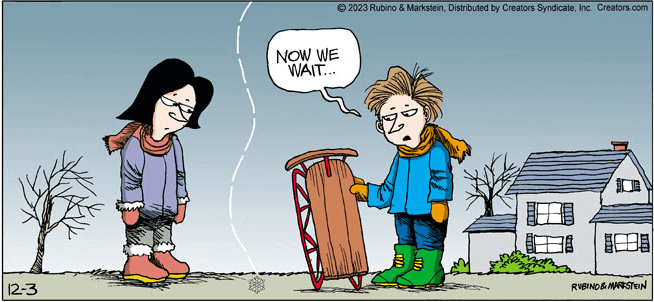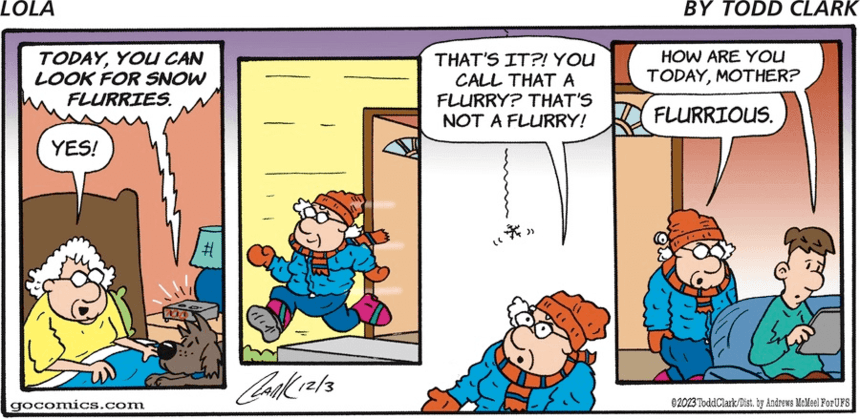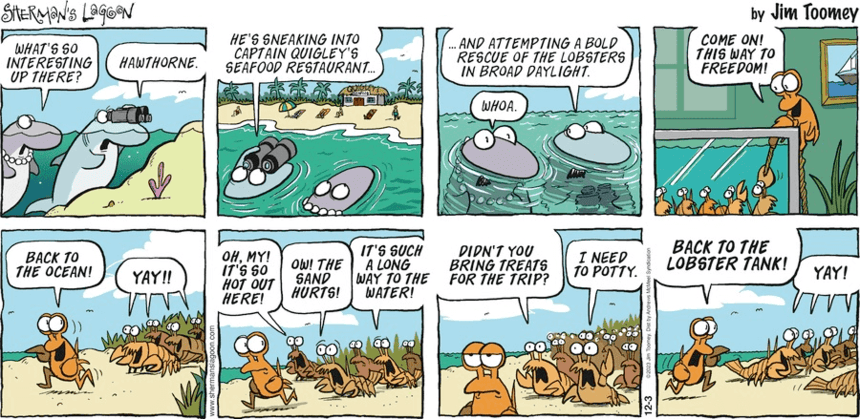CSotD: Of Snowflakes, lobsters and woolves.
Skip to comments


Yesterday’s comics page didn’t have a Juxtaposition so much as a three-strip pile up. One might suspect that all of the comic strip people live in the same town, but Red and Rover don’t even live in the same year as the others, being in an unspecified throwback time period.
Comic strippers face a challenge in doing seasonal gags. It’s easy enough to know when a particular holiday is coming, and general gags usually work: Hot summer days, crisp fall weather, snow in January. But “first snow” is a tough one, given that some of the audience never sees it at all, while others are used to having to devise Halloween costumes that will fit over snow suits if necessary.
As it happens, we did get a very brief flurry amid the rain yesterday, though it wasn’t our first and it was very local. The Patriots played in a downpour two hours to the southeast, while this morning there are a slew of weather-related school closures and delays here, but they must have been declared yesterday, because I see we only got about an inch overnight.
Your pileage may vary.
But as said, some people were reading these strips in places where it doesn’t ever snow, which reminds me that variation is permitted: Lynn Johnston broke ground decades ago by refusing to make her mailboxes blue because “For Better or For Worse” is set in Canada where mailboxes are red.
Since then, all hell has broken loose and we’ve got strips in which people celebrate Thanksgiving in October and travel to places like Vancouver to visit relatives.
It was a slippery slope. Prob’ly all that snow.

Meanwhile, Arlo and Janis (AMS) are down south, contemplating a relatively short move to the Gulf Coast where snow would indeed be an astonishing event, though their weather seems to vary more by happenstance than geography.
What I found more interesting in Arlo’s conversation with Mary Lou’s father is a reflection on the demise of those mom-and-pop tourist places, and that’s certainly not confined to any particular part of the country.
I grew up in the transition, when there were small amusement parks in every region, the best of them designed by Arto Monaco, who created places for kids before working on Disneyland. His Land of Make Believe lasted long enough that I was still able to bring my own kids there and even return a decade later to tour it with Arto after repeated spring flooding had finally shut it down.
But more of these little places closed because of the rise of major parks like Disneyland and Disney World and the various Universal parks and Great Escapes, together with airfares becoming low enough that families could leave their own regions.
Not to suggest that the megaparks are what I would call affordable, mind you.
If you drive to the coast, you can still find a clam shack for some local food, though. It’s right there between the McDonald’s and Burger King, across the road from Pizza Hut.

According to Sherman’s Lagoon (AMS), the inability of people to just go enjoy a trip to the beach, and their reliance on familiar, commercial settings, has spread to other members of the animal kingdom.
Thank goodness, there are hold-outs. When I was in Western Maine, there was a housefire up in the hills that the firefighters call a “Y’all come,” meaning every fire company in the area had been called out.
As I drove up to cover it for the paper, I realized it was the middle of the February school break and half the volunteers would probably be in Orlando while the other half would be at work in the paper mills.
Nope. They were all on vacation, but vacation there meant snowmobiles and skiing. The place was more crowded than if it hadn’t been a holiday.
Couldn’t save the house, but they saved my faith in people’s affection for home.

Here’s a head-scratcher from B.C. (Creators): A mother-in-law joke that references a platform that isn’t called “Twitter” anymore and that has stopped banning anybody unless they dare to criticize the muskrat.
Here: Catch up on what’s what in X-land.

Maybe the reason that I used a clip from Edward Albee’s play yesterday was that this Macanudo (KFS) had placed it in my subconscious.
Trivia: Disney wouldn’t let them use the actual song, so that the actors have had to invent a tune for the moment in the play when Martha sings the couplet from which the play takes its name. I don’t know who’s afraid of Virginia Woolf, but we’re all scared of the Mouse.
As for the woman herself, she was a wonder, unfortunately remembered today more for a few quotes than for her actual prose, though To the Lighthouse was one of the few women-written books we studied in college, proving the point of the quote in the strip.
They’ve long since updated the curriculum, but I had to discover Jane Austen on my own, which should not have been the case. If nothing else, she’s one of the few authors who can actually make me LOL, the other being Anthony Trollope, whose The Way We Live Now is a searing satire that is as relevant today as it was when he wrote it in the Gilded Age.
As it happens, the familiar quotation is not precise. What Woolf actually wrote — in A Room of One’s Own — was “I would venture to guess that Anon, who wrote so many poems without signing them, was often a woman.”
And, if you click that link, you can read the whole thing and discover that she wasn’t kidding around:

It’s not “ironic” that she died by her own hand, but simply “sad.” She seems likely to have had bipolar disorder, with a history of both depression and manic episodes that apparently allowed her to step outside the norm and view it from a distance.
It is not necessary for artists to be mad, nor is mental illness any sort of gift. Still, she was right: Austen did publish anonymously, and the Brontes and Mary Ann Evans published under masculine pen names.
Fortunately, as James Thurber wrote, “It is not so easy to fool little girls nowadays as it used to be.”

Comments 9
Comments are closed.